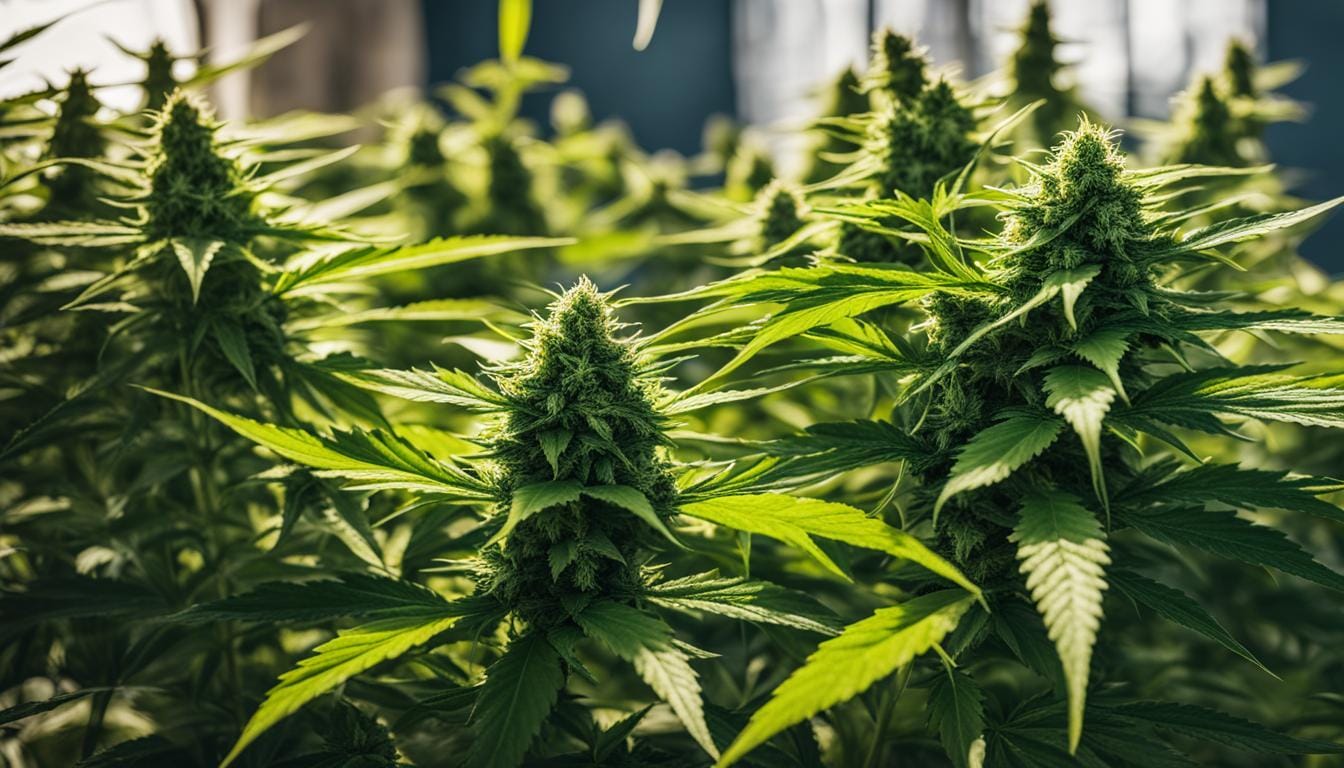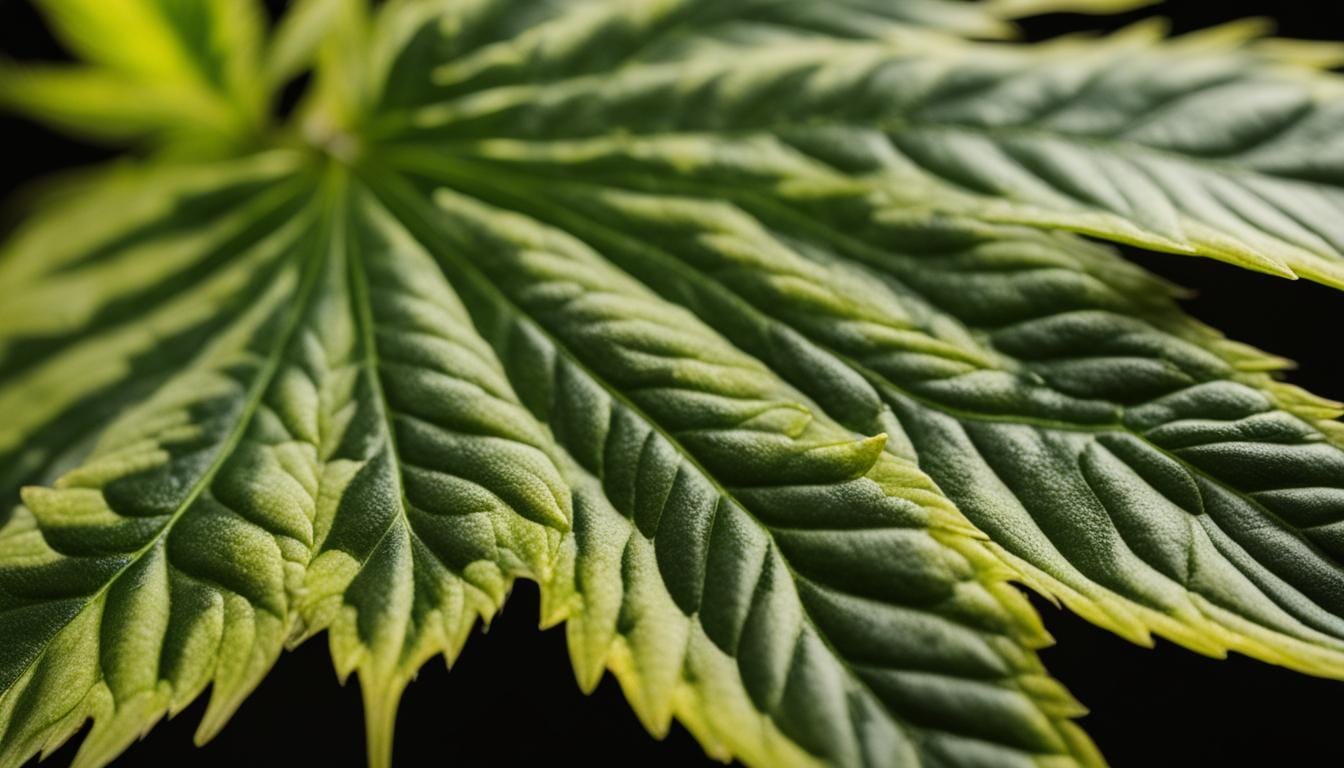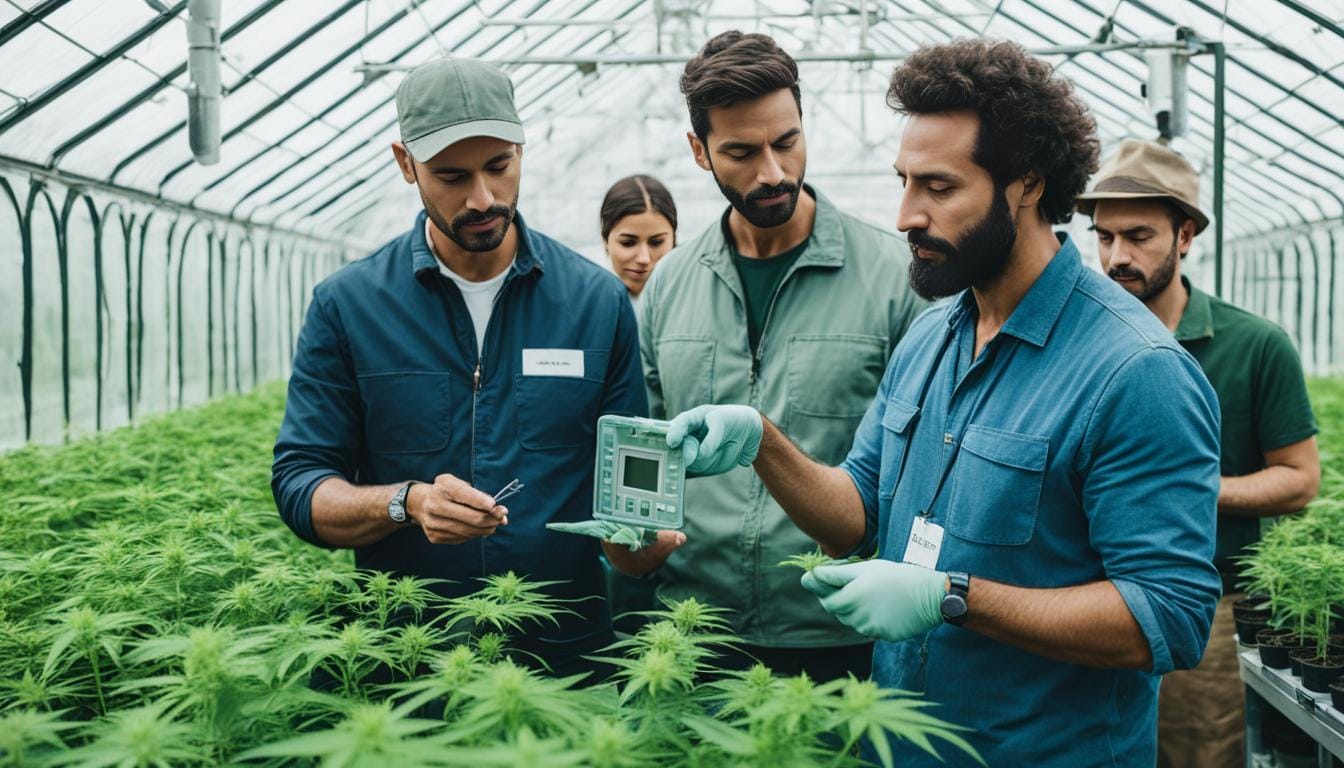Nitrogen Deficiency in Cannabis Plants: Signs & Fixes

Nitrogen deficiency in cannabis is a grower’s worst alarm bell, making a solid grasp of plant-nutrition essentials pivotal. Nitrogen is the lifeblood of lush, green growth, and when levels dip, a cascade of problems can tank your crop’s health and yield. Yellowing leaves and stunted growth are the unmistakable symptoms that demand swift corrective action.
Quick intervention is key, and the task begins with a keen observation of the telltale signs of nitrogen deficiency in cannabis plants. Addressing this swiftly with an effective nitrogen supplement will rescue your crop and propel it back to its potential glory.
But where does one start? Knowledge is power, and we plunge into prevention, identification, and cure to empower you. Recognizing the signs of nitrogen deficiency in cannabis can be the difference between a bountiful yield and a botanist’s heartache. So buckle up, we are about to delve into the green world, gleaning insights that could turn the tide for your cannabis crop. Let’s begin!
Key Takeaways
- Look out for yellow or pale green leaves as an early warning of nitrogen deficiency in cannabis
- Learning how to identify nitrogen deficiency in cannabis is crucial for a quick response and treatment
- Understand that nitrogen deficiency symptoms in cannabis are not just cosmetic but indicative of deeper nutritional issues
- Nitrogen deficiency treatment in cannabis requires a multifaceted approach, touching on soil health, fertilization, and pH balance
- Awareness of the signs of nitrogen deficiency in cannabis can prevent further damage and promote recovery
Understanding Nitrogen’s Role in Cannabis Cultivation
Nitrogen is a cornerstone nutrient in the world of horticulture, and its role becomes even more pronounced when it comes to cultivating vigorous cannabis plants. As one of the primary macronutrients, nitrogen is instrumental in encouraging lush foliage and laying the groundwork for the plant’s overall vigor and health. Let us delve into why nitrogen holds such sway in cannabis growth and how its deficiency causes repercussions that could impede your cultivation efforts.
Why Cannabis Plants Need Nitrogen
To appreciate nitrogen’s importance in plant growth, especially for cannabis, one must recognize that this element is fundamentally responsible for creating amino acids—the building blocks of proteins. Proteins are vital for the structure, function, and regulation of the plant’s cells, tissues, and organs. Beyond structure, nitrogen’s role includes facilitating critical plant processes, such as cellular growth and the synthesis of genetic material. Without adequate nitrogen, cannabis plants struggle to support basic life-sustaining activities, often leading to diminished health and vitality.
The Relationship Between Nitrogen and Plant Growth
As cannabis plants progress through their life cycle, a consistent supply of nitrogen supports and accelerates vegetative growth. Strong, resilient stems and a rich canopy of green are visual affirmatives of nitrogen at work. However, insufficient nitrogen can trigger a cascade of growth issues, setting off an alarm for growers to address the root cause. The symptoms of nitrogen deficiency might begin subtly, yet they can swiftly progress, transforming a once-thriving plant into one that displays stunted growth and overall decline.
Nitrogen and Its Function in Photosynthesis and Protein Synthesis
Integral to turning light into life, nitrogen is essential for chlorophyll production—the green pigment allowing plants to absorb sunlight and convert it into chemical energy through photosynthesis. Without nitrogen, this process becomes inefficient, and the plant’s capacity to generate energy is severely hindered. In addition, nitrogen is directly involved in protein synthesis, ensuring that cannabis plants have the necessary components to produce enzymes and structural proteins contributing to robust growth and resilience against environmental stressors. These roles collectively underscore how nitrogen deficiency in cannabis could have far-reaching effects on plant health and yield.
Identifying Nitrogen Deficiency in Cannabis Plants
Recognizing the early signs of deficiency is a crucial step for cultivators seeking effective nitrogen solutions for cannabis. Vigilant monitoring for symptoms is a fundamental aspect of nitrogen deficiency prevention in cannabis cultivation.
Nitrogen is a mobile nutrient vital to the growth and health of cannabis plants. Its mobility within the plant means that when nitrogen is scarce, it reallocates it from older foliage to support new development. The redistribution often results in identifiable symptoms in the older leaves first.
- Yellowing of older leaves, which may present as they turn light green and progress to yellow
- Stunted growth of the plant compared to its expected growth rate
- A general pale green coloration spreading through the plant, signifying an overall lack of nitrogen
Proactively spotting these signs can safeguard a harvest from impaired growth and preventable yield loss. After identifying a potential nitrogen deficiency, one should consult guides or experts to solve the issue promptly.

Common Signs of Nitrogen Deficiency in Cannabis
When cultivating cannabis, recognizing the signs of nitrogen deficiency is crucial for the overall health of your plants. A nitrogen-rich environment is key for vigorous growth, but several symptoms can manifest when this essential nutrient is lacking, indicating an urgent need for corrective action.
Pale Green or Yellow Leaves as Early Indicators
The initial symptom of nitrogen deficiency usually presents as a discoloration of the older leaves at the bottom of the plant. The foliage begins to turn a pale green and eventually yellow. This condition is called chlorosis and is a clear sign that your plants struggle to synthesize enough chlorophyll due to insufficient nitrogen.
The Impact of Deficiency on Growth and Yields
A continued lack of nitrogen can severely affect a cannabis plant’s growth. The stunted vegetative phase means fewer branches and a sparse canopy, directly influencing yield sizes. Given the right conditions, nitrogen deficiency can be resolved, but the lost growth time can never be recovered, reducing the plant’s overall productivity.
Detecting Leaf Roll or Curl and Necrosis
As the deficiency progresses, look for more serious symptoms such as curling or rolling up of the leaves. This is often a plant’s attempt to reduce the surface area that loses water. More advanced stages may also exhibit necrosis, where the affected leaves turn brown to black and die off altogether.
| Sign | Early Stage | Advanced Stage |
|---|---|---|
| Leaf Color | Pale green to yellow | Brown to black necrotic spots |
| Growth Impact | Stunted vegetation | Significant yield loss |
| Leaf Position | Older leaves are affected first | Widespread chlorosis |
| Leaf Texture | Beginning to wilt | Curling, rolling, and eventual death |
Understanding how to identify nitrogen deficiency in cannabis and recognizing these warning signs are the first steps towards remedying the problem and ensuring your cannabis plants grow to their full potential.
Exploring the Causes Behind Nitrogen Deficiency in Cannabis
Understanding the causes of nitrogen deficiency in cannabis is essential for growers looking to maintain healthy plants. The presence of nitrogen is critical for the development and vitality of cannabis, and several factors can impede its uptake, leading to deficiency symptoms. Acknowledging these factors not only helps identify nitrogen deficiency in cannabis but also paves the way for effective corrective measures.
Among the commonly reported causes, imbalanced soil pH levels significantly affect nitrogen availability to the plant roots. Soil that is too acidic or alkaline can restrict a plant’s ability to absorb this vital nutrient. Another notable cause is nitrogen depletion in the soil, which may occur over time, especially in soils that lack organic matter or where crop rotation is not practiced.
The right balance of watering is crucial, as both over-watering and under-watering can lead to nitrogen being less available or more prone to leaching away from cannabis roots.
Moreover, over-fertilization can cause a nutrient lockout, where excess minerals build up and precipitate, making nitrogen inaccessible to plants. Conversely, an overabundance of other nutrients, such as phosphorus and potassium, can antagonistically suppress a plant’s nitrogen absorption.
Lastly, stress from pests and diseases can significantly hinder a plant’s capacity to take up nitrogen and other nutrients, often exacerbating the deficiency. As such, growers must be vigilant in managing the cultivation environment to minimize stress.
Common Stress Factors
- Soil pH imbalance
- Nitrogen depletion
- Over-watering or under-watering
- Nutrient lockout due to over-fertilization
- Excessive levels of other nutrients, like phosphorus and potassium
- Stress from pests and diseases
| Cause | Signs | Preventive Measures |
|---|---|---|
| Imbalanced Soil pH | Reduced nutrient uptake | Regular soil pH testing, adjustments with lime or sulfur |
| Nitrogen Depletion | General plant weakness, chlorosis | Adding organic matter, crop rotation |
| Over-Watering | Nutrient leaching | Proper irrigation practices |
| Over-Fertilization | Nutrient lockout, salt buildup | Adhere to recommended fertilizer rates |
| Excess Phosphorus or Potassium | Suppressed nitrogen absorption | Nutrient balance checks, careful fertilizer application |
| Pests and Diseases | Plant stress, visible damage | Integrated pest management, regular inspections |
Nitrogen deficiency in cannabis can be a perplexing challenge to address, but understanding its underlying causes is the first step toward successful remediation and prevention. Through vigilant monitoring and adopting tailored cultivation practices, growers can safeguard their crops against the pitfalls of nitrogen shortages, ensuring robust growth and optimal yields.
Nitrogen Deficiency Solutions for Cannabis
Combatting nitrogen deficiency in cannabis is pivotal for ensuring vigorous plant growth and bountiful yields. Deploying the right strategy can reverse symptoms and bolster the health of your plants.
Choosing the Right Fertilizer
Addressing a nitrogen deficiency begins with selecting a high-nitrogen fertilizer. Options include organic solutions like blood meal and fish emulsion, or synthetic types such as urea and ammonium nitrate. Temperature, soil type, and growth stage should guide your choice, ensuring that nitrogen is released at a rate that matches your plants’ needs.
Balancing Soil pH for Optimal Nitrogen Uptake
The soil’s pH level must be within a specific range to enhance nitrogen absorption. Cannabis plants thrive when the soil pH is between 6.0 and 7.0. Periodic testing and amendments, such as lime or sulfur, can correct imbalances, promoting healthier growth.
Nitrogen deficiency solutions for cannabis are not merely about supplementing nutrients; it’s about creating a conducive environment for plants to self-regulate and access necessary resources efficiently.
Preventing Nitrogen Deficiency in Cannabis Plants
The success of cannabis cultivation hinges on maintaining optimal nutrient levels, with nitrogen playing a particularly pivotal role in plant health. Vigilance in nitrogen deficiency prevention in cannabis is far more advantageous than battling the aftermath of deficiency. By integrating regular soil analysis and fine-tuning irrigation, growers can preserve the delicate balance required for robust cannabis growth.
Regular Soil Testing: A Preventive Measure
Soil testing is a cornerstone practice in preemptive nutrient management, providing essential pH and nutrient levels data. Conducting these tests periodically allows growers to take informed actions to prevent the onset of deficiencies, safeguarding their crops from the stresses associated with inadequate nutrition.
Effective Irrigation Practices to Avoid Nutrient Leaching
Proper watering techniques are fundamental in preventing nutrient leaching, a common cause of nitrogen deficiency. Cultivators can ensure a steady nitrogen supply through efficient irrigation practices, ultimately leading to vigorous and healthy cannabis plants.
| Aspect | Benefit | Key Consideration |
|---|---|---|
| Soil Testing Frequency | Ensures timely identification of potential deficiency | Test every 2-4 weeks during the growing season |
| Irrigation Method | Reduces the risk of leaching essential nutrients | Use drip systems or soak methods for deep, even application |
| pH Level Monitoring | Optimizes nutrient absorption | Maintain soil pH between 6.0 and 7.0 |
| Fertilization | Supplements plants with the necessary nitrogen | Choose fertilizers that release nitrogen slowly to match plant uptake rates. |
Implementing these preventive strategies, underscored by consistency and mindfulness, is essential for growers aiming to cultivate cannabis with ample yields and high quality. Nitrogen deficiency treatment in cannabis, while necessary in some instances, should be a reactionary measure rather than a standard practice. With proper prevention, treatment becomes a rare intervention. Consequently, nurturing a thriving cannabis garden becomes an attainable reality rather than a daunting challenge.
Nitrogen Deficiency Treatment in Cannabis
When it comes to nitrogen deficiency treatment in cannabis, growers must act swiftly to mitigate losses. Identifying the issue involves looking for the classic signs, namely yellowing of the older leaves, while staying vigilant throughout the plant’s growth cycle.
Effective treatment begins with applying pre-mixed nutrients known for their nitrogen content. Options such as nitrate of soda offer a fast-acting source. Meanwhile, certified organic options, like Gaia Green 4-4-4, provide an eco-friendly choice for growers looking to maintain a natural garden environment. Ensuring soil balance, these treatments must be carefully dosed, considering each plant’s requirements and overall health.
Here’s a quick-reference treatment guide:
- Confirm nitrogen deficiency by noting the early signs
- Use pre-mixed fertilizers containing nitrogen
- Adjust pH levels for maximum nutrient uptake
- Consider liquid plant foods for immediate deficiency correction
- Apply mulching techniques to help prevent future leaching
Proper pH level is a cornerstone of efficient nutrient uptake; hence, it’s paramount to test and adjust the soil pH when dealing with a nitrogen deficiency. The ideal range for cannabis is slightly acidic to neutral, between pH 6.0 and 7.0. Liquid plant foods can also boost concentrated nitrogen, critically supporting plants with advanced deficiencies.
Mulching serves a dual purpose, enriching the soil with nitrogen as it decomposes and conserving soil moisture. This practice aids in nitrogen deficiency treatment in cannabis and contributes to overall plant resilience against environmental stressors.
It’s worth noting that every intervention should be followed by careful monitoring to assess the effectiveness of the treatment and to fine-tune the approach for optimal plant health. Both proactive and reactive strategies are vital for cultivating thriving cannabis plants.
Organic Versus Synthetic Fertilizers for Nitrogen Boost
When nurturing your cannabis plants, ensuring they receive the right amount of nutrients is crucial. Nitrogen is particularly paramount for vigorous growth. As one ventures into nitrogen deficiency solutions for cannabis, a crossroads is encountered when choosing between organic nitrogen fertilizer for cannabis and its synthetic counterparts. Both avenues have their merits and can be selected based on the needs of your plants and the garden’s ecosystem.
The Benefits of Organic Fertilization
Organic fertilizers are lauded for their sustainable approach to plant nutrition. Products such as worm castings and compost rectify nitrogen deficiencies and enrich the soil with many beneficial microbes. The slow-release nature of these organics ensures a steady supply of nutrients, reducing the risk of over-fertilization and the subsequent nutrient burn. Enhancing soil structure bolsters water retention and aeration, leading to robust root systems and healthy cannabis plants.
Organic fertilizers are like a steady, balanced diet for plants, offering a comprehensive approach to nutrient release and soil health.
When To Use Synthetic Fertilizers
Synthetic fertilizers serve as a fast-acting remedy for nitrogen deficiency. These fertilizers immediately supply nitrogen to the plants, which is essential in critical growth stages or when time is of the essence. However, applying these carefully is essential, as they pose the risk of overuse, potentially leading to adverse effects on plants and the environment.
- Quick Absorption: Synthetic fertilizers are immediately available to plants, providing a swift nitrogen boost.
- Precision: They allow for targeted nutrient application, mainly when used with soil tests.
- Efficiency: In large-scale operations, synthetic fertilizers can prove to be more cost-effective and less labor-intensive.
Ultimately, the decision between organic and synthetic should align with your cultivation practices, ecological awareness, and the specific needs dictated by your cannabis plants’ growth stage. Balancing both types of fertilizers might sometimes offer the best of both worlds, ensuring your cannabis thrives with a plentiful supply of the all-essential nitrogen.

Employing Nitrogen Fixing Bacteria for a Healthier Grow
For growers intent on nitrogen deficiency prevention in cannabis, the incorporation of nitrogen-fixing bacteria presents an innovative solution. These microscopic allies, like Azospirillum brasilense found in Azos by Xtreme Gardening, convert nitrogen from the atmosphere into a form that cannabis plants can readily absorb. This symbiotic relationship bolsters plant health and vigour and serves as a critical component for sustainable agricultural practices.
Understanding how to identify nitrogen deficiency in cannabis is essential for growers; however, utilizing beneficial bacteria can mitigate these concerns before they impact crop yield. By establishing a thriving population of these bacteria within the soil, cannabis cultivators can create a self-sustaining ecosystem that naturally enhances nitrogen levels, thereby reducing dependency on external fertilizers.
Integrating nitrogen-fixing bacteria into the soil is akin to building a nutrient factory right at the roots of your cannabis plants, continuously converting and supplying essential nitrogen for optimal growth.
Let us delve into a comparison of soil with and without the integration of nitrogen-fixing bacteria:
| Soil Condition | Nitrogen Availability | Plant Growth | Overall Soil Health |
|---|---|---|---|
| Without Nitrogen-Fixing Bacteria | Low, requires frequent fertilization | Potentially stunted due to nutrient deficits | May suffer from imbalances and reliance on fertilizers |
| With Nitrogen-Fixing Bacteria | Improved, nitrogen naturally supplemented | Enhanced, supported by a steady nutrient supply | Improved, promoting a more balanced ecosystem |
As demonstrated, introducing these microorganisms to your grow not only aids in preventing nitrogen deficiency in cannabis but also contributes to greater resilience and stability within your soil’s ecosystem.
- Ensures a consistent nitrogen supply without over-reliance on chemical fertilizers
- Promotes stronger, healthier plant development with increased resistance to common growth issues
- Contributes to the sustainability of cannabis cultivation by facilitating a natural nutrient cycle within the soil
By using nitrogen-fixing bacteria, cannabis growers can expect a more harmonious and sustainable approach to cultivation, ensuring long-term soil health and plant vitality.
The Role of Proper Cultivation Practices in Preventing Deficiencies
Adopting proper cultivation techniques is fundamental in promoting a robust growth environment for cannabis plants. These methods aid in nitrogen deficiency prevention in cannabis and ensure the overall well-being of the plants through various stages of development. Expert growers recognize that one of the pillars of successful cannabis cultivation lies in meticulous attention to watering and stress-management routines.
Appropriate Watering Techniques
To minimize the risk of nitrogen deficiency, it’s essential to implement watering practices that resonate with cannabis plants’ needs. Overwatering can lead to nutrient leaching, while underwatering may impede nutrient uptake. Optimal watering means allowing deep water penetration and letting the soil dry out before the next watering cycle. This technique encourages strong root development and enhances the efficient uptake of nitrogen and other nutrients.
Monitoring Plant Stress and Its Effect on Nutrient Uptake
Stress factors such as pests, diseases, and extreme environmental conditions can profoundly impact a plant’s ability to absorb nutrients. Growers can significantly reduce plant stress by maintaining cleanliness around the cultivation area and employing natural pest control methods. This proactive approach not only contributes to appropriate cultivation techniques for cannabis but also bolsters the plants’ immunity, leading to healthier growth and reduced susceptibility to nutrient deficiencies.
Advancements in Soil Technology for Enhancing Nitrogen Availability
The agricultural sector has witnessed remarkable advancements in soil technology that significantly impact cannabis cultivation. These innovations are revolutionizing how we think about and tackle nitrogen deficiency solutions for cannabis. By integrating cutting-edge research and development, growers can utilize substrates and soil amendments designed to boost nitrogen levels effectively.
Notably, emerging soil amendments are formulated to provide slow-release nitrogen, ensuring a steady supply that meets cannabis’s dynamic needs. These compounds are modified to optimize both the delivery and absorption of nutrients, laying the groundwork for healthier, more resilient plants. Particularly in cannabis cultivation, where precision is key, these enhancements are proving invaluable.
- Substrates enhanced with organic matter naturally enrich the soil with nitrogen.
- Soil conditioners that promote microbial activity, aiding in the breakdown and release of nitrogen
- Biostimulants that encourage root growth and improve the plant’s nitrogen uptake efficiency
Conversations around soil health are no longer just about N-P-K ratios but also the overall ecosystem within the soil. By fostering a robust soil environment, the symbiosis between plants and beneficial microbes is enhanced, leading to more effective nitrogen utilization and, hence, a better yield.
“These soil advancements not only cater to immediate nutritional needs but also promise long-term sustainability and environmental stewardship in cannabis agriculture.”
With advancements in soil technology, which prioritize plant health and nutrient management, cannabis growers are better than ever equipped to prevent and address nitrogen deficiencies. These innovations underscore the significant progress made in contemporary agricultural practices and spotlight the ongoing commitment to sustainable and efficient cannabis cultivation.
Nitrogen Deficiency in Cannabis Plants: Conclusion
The health and productivity of cannabis plants hinge significantly on aptly identifying and fixing nitrogen deficiency in cannabis. This can be a complex challenge, but through vigilant observation, a grower can detect and rectify issues before they escalate. It’s essential to incorporate preventative strategies such as routine soil tests and tailor irrigation and fertilization practices that bolster plant resilience against deficiencies.
When deficiencies do occur, growers have a range of nitrogen supplements at their disposal. The choice between organic and synthetic fertilizers should be influenced by the plant’s immediate needs, the grower’s preferences for sustainable practices, and the specific conditions of the growing environment. If the issue is nitrogen-related, promptly addressing it with the proper adjustments can lead to a quick recovery.
Furthermore, advancements in soil technology contribute to a more seamless integration of nutrient management, ensuring that plants receive adequate nitrogen throughout their growth cycle. By focusing on detailed soil and plant analysis, coupled with the implementation of cutting-edge growing practices, cultivators can effectively meet the nutritional demands of their cannabis plants. Ultimately, this leads to healthier plants and more bountiful harvests, reinforcing the value of mastering nutrient management in successful cannabis cultivation.
Now that you know how to identify and treat nitrogen deficiency in cannabis plants, shop the collection of regular, feminized, and autoflower cannabis seeds at Seeds Here Now.
FAQ
What are the common signs of nitrogen deficiency in cannabis plants?
Common signs include the older leaves’ yellowing or pale green coloration, stunted growth, leaf roll or curl, and necrosis in advanced cases. If the plant is flowering, you may also see a few flowers.
Why do cannabis plants need nitrogen?
Nitrogen is essential for forming chlorophyll, which is necessary for photosynthesis. It also plays a crucial role in protein synthesis and cell division, supporting the plant’s growth and overall health.
How can nitrogen deficiency impact the growth and yield of cannabis?
Nitrogen deficiency can lead to reduced vegetative growth, fewer or smaller buds, and in severe cases, the death of the plant. This deficiency compromises the plant’s ability to synthesize essential compounds, negatively affecting its development and productivity.
What causes nitrogen deficiency in cannabis?
Nitrogen deficiency can be caused by various factors, including soil depletion, improper soil pH levels, over-fertilization leading to nutrient lockout, over-watering, and environmental stress from pests and diseases.
How can you treat nitrogen deficiency in cannabis plants?
Treatment includes using nitrogen fertilizers, correcting soil pH levels, using liquid plant foods for a quick fix, and incorporating organic matter like compost or worm castings to improve soil health and nitrogen content.
What are some preventive measures against nitrogen deficiency in cannabis?
Preventive measures include regular soil testing to monitor pH and nutrient levels, effective irrigation practices that reduce nutrient leaching, and the use of nitrogen-fixing bacteria to naturally enrich soil nitrogen levels.
What is the role of nitrogen-fixing bacteria in cannabis cultivation?
Nitrogen-fixing bacteria, such as those found in products like Azos, help naturalize atmospheric nitrogen into a form accessible to plants, enhancing soil nitrogen content and promoting healthier growth.
When should synthetic fertilizers be used over organic options?
Synthetic fertilizers can be used when an immediate boost in nitrogen is required or if the plant shows severe deficiency symptoms. They offer a concentrated and quickly available source of nitrogen.
Can advancements in soil technology aid in nitrogen absorption for cannabis plants?
Yes, soil substrates and amendments have been redesigned to enhance nutrient delivery, including nitrogen, optimizing the plant’s intake and overall health.
How do proper cultivation practices prevent nitrogen and other nutrient deficiencies?
Appropriate cultivation practices, like ideal watering techniques, promote efficient nutrient uptake. Keeping plants free from pests and diseases also ensures they can absorb nutrients effectively, including nitrogen.
Suggested Articles
;)
;)
;)




 24 Jun 2025
24 Jun 2025  5 min read
5 min read


 January 16, 2024
January 16, 2024 


RESPONSES (0)
No responses yet. Be the first to respond!